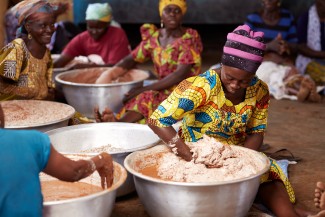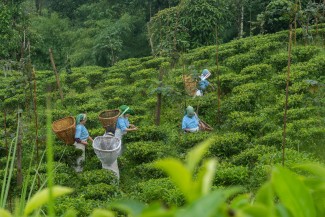On the sidelines of the Aid for Trade Global Review 2019, The Gambia’s Vice President discusses the potential of women in trade
You have been speaking about how important it is to empower women economically. How can trade help to improve the lives of women in least developed countries (LDCs) like The Gambia?
Trade is one of the catalytic issues that will unleash the potential of the LDCs across the spectrum. But we also need to take into account the fact that women have been through this for a very long time and they have been engaged in most of the issues, and yet the statistics when you give them a glance it does not seem like their concerns have been taken into consideration.
With the dimension of trade as an empowering process for LDCs, I think gender considerations have to be given all importance so that the contribution of vulnerable groups – mainly women and young people – can feature prominently. Policies and the support that is given need to focus on them and have the strategic direction that will help the groups unleash themselves. And this will address poverty in general too.
I feel that it is when there is inclusiveness in this whole process that Africa and the world over will be able to regain its potential in terms of the impact that we want to make, without leaving anyone behind.
Women are a very critical category for me because they are being affected by traditions, belief systems and the patriarchal structures that dominate most of these processes that put women at the back of everything. But yet when you come to look at the lived realities within our countries, in the field of agriculture for example women have a primary role to play. They are involved in a lot of production processes, but when it comes to key decision-making positions, ownership of productive resources and also making decisions on matters of the household economy, they are second-class citizens. These are the things that we have to address.
Women are key if we want to address the gaps we have, so using trade as a lever to unleash potential is important for both women and men but most of all women because trade is supposed to address those gaps and challenges, and the vulnerabilities that we talk about in terms of the economy.
What is The Gambia doing to address these challenges for women?
The Gambia is quite aware of the challenges because if you look at the agriculture sector – looking at the gender disaggregated statistics – the number of women who own productive resources is limited. There are efforts being made to improve this and the Ministry of Agriculture is looking at this seriously. The Ministry of Trade is using trade as a vehicle to empower and to address poverty. There is also focus on small and medium-sized enterprises that women and young people are involved with. So what The Gambia is doing now is looking at our policies and improving them to be gender responsive and gender sensitive and also disaggregating data to be able to have the right information and analysis at the same time. This will inform the type of interventions required.
In The Gambia we have SheTrades that was introduced under the Ministry of Trade. It really has done a great deal for the economic outlook of women and to empower them to face the international global market. They have been training women in exporting, adding value to small-scale production as well as the fashion industry, and improving some of the products that women sell. I have witnessed quite a number of opportunities that were created by the International Trade Centre (ITC) with SheTrades for young female entrepreneurs and if this trend continues we are sure to make gains and increase the number of women in business.
What The Gambia is doing now is looking at our policies and improving them to be gender responsive and gender sensitive and also disaggregating data to be able to have the right information and analysis at the same time.
The Gambia Vice President Isatou Touray
One innovation is that businesswomen have come together to form The Gambia Women Chamber of Commerce. We have The Gambia Chamber of Commerce but it is a general body. Looking at the gender specificities we realized that there are gaps and in order to address those gaps we need gender-specific approaches and The Gambia Women Chamber of Commerce is coming and it is led by the former Permanent Secretary at the Ministry of Trade when I was the Minister. It is a combination of more than 15 women entrepreneurs who have been long in the field of business and have the connections and they have come together in order to uplift the situation and circumstances of women in trade.
When I saw that it was very positive for me – that there is hope that things will change within a short time and there are people who are really taking the responsibility. I believe with all the initiatives taking place and EIF giving the necessary support to institutions and strengthening the Ministry of Trade and the SheTrades initiative in The Gambia I think we are here to move.
We will be a shining example for others because it is key that women are given special focus in order for them to unlock themselves from that position of exclusion to inclusion and at the same time to empower them to be confident enough to take responsibility in defining their destiny economically and empower them to compete effectively in the global market.
You mentioned the urgent need for data related to women and trade. Can you explain?
It’s very important because statistics and data speak for themselves. If I see a report that shows this is where the gender gaps lie it informs my intervention in that particular aspect. For example, when you know that there are almost 80% of the women in the agriculture sector producing crops like groundnuts and you want to add value to that you find that they are marginalized in that processing sector but they are dominating in agriculture. So you know you are losing the whole essence of empowerment and poverty reduction if you don’t take those women into account.
Disaggregated statistics give you an appreciation of where to address gaps and understanding where you are taking things for granted. The moment we started applying gender analytical frameworks in almost all aspects of development then we began to see the changes and how these things are being addressed and responded to in various policy documents and development programs across the world.
And that is what makes our work smarter and more effective in making the resources that are needed for gender equality and gender equity as well as social justice available in the right places.
If you would like to reuse any material published here, please let us know by sending an email to EIF Communications: eifcommunications@wto.org.


